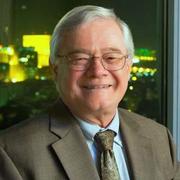
Romania has made significant progress in its trek from Communism, but the path toward change has been a long and difficult one.
With that in mind, Romanian government officials organized a conference on religious freedom where they sought the insight of thought leaders from around the world, including Harvard Divinity School's Dudley Rose, Associate Dean for Ministry Studies.
The conference was organized by the Romanian Parliament and the Conscience and Liberty Association, who hoped participants would help develop religious freedom as an academic concept and advance a consciousness of human rights and freedom of religion and belief.
"The focus I tried to impart was learning about other religions versus learning from other religions, which implies the possibility of change and being affected by another person," said Rose, who spent a week in the country of 20 million. "Religious freedom must ultimately include the level of respect and regard for other traditions that allows learning from them, that is, that sees them as legitimate voices in a globalized world."
More than 80 percent of Romanians are Eastern Orthodox. The next largest affiliations are Protestant at 6 percent and Catholic at 4 percent, according to the CIA World Factbook.
In 1989, the country was able to overthrow its oppressive dictator, Nicolae Ceaușescu. In 2007 it joined the European Union. And, after what some media outlets referred to as a surprise win, Klaus Iohannis, a Lutheran, was sworn in as the country's president in December 2014 and promised to fight corruption.
According to Rose, the election of Iohannis carried huge significance.
"It was a surprise. Part of the surprise was that he's not Orthodox. You get a sense that the country made quite a statement there, that they could elect somebody when there's been such a tight connection between politics and the church in many respects," he said.
In the past two decades, the country has made efforts to move closer to the secularized West, creating a period of adjustment and uncertainty for its own religious institutions and traditions.
Speaking before government officials and other leaders at Romania's massive Palace of the Parliament, Rose recounted the founding of Harvard and the Divinity School and the history of studying religion at the University. He explained that the School's latest major curriculum change envisioned a multireligious divinity school and allowed students to prepare for ministry in particular traditions in an intentionally diverse religious setting.
"When religious traditions are conceived to be on equal footing, when other traditions are not simply tolerated but are seen to have importance in and of themselves, and when they are seen to have voices worth listening to, then they must also be seen to be inhabited by equally human religious subjects," Rose told the officials during the October conference.
"It is a commonplace that seeing others as less human than oneself paves the way to justifying violence against them. Similarly, seeing other religions as less valuable or more primitive than one's own makes violence and intolerance or, more subtly, benign reproach towards them, all the more easy."
Rose said he felt like he was invited to be part of a conversation that was taking place in the country. He said he talked to multiple television stations and noted that there were different TV channels for different faiths. While there, he also met with an Orthodox bishop, toured a Seventh-day Adventist school, and attended a high school concert put on in his honor.
Despite clear advances and the country's motivation to enhance religious tolerance and literacy, Rose said he left with a reconfirmed sense of how hard change really is.
"You see things that are entrenched and are very, very difficult to change, and even though you have moments like this recent election and you may look back at it as a watershed moment, there's a lot of slow work in between."
–by Michael Naughton
